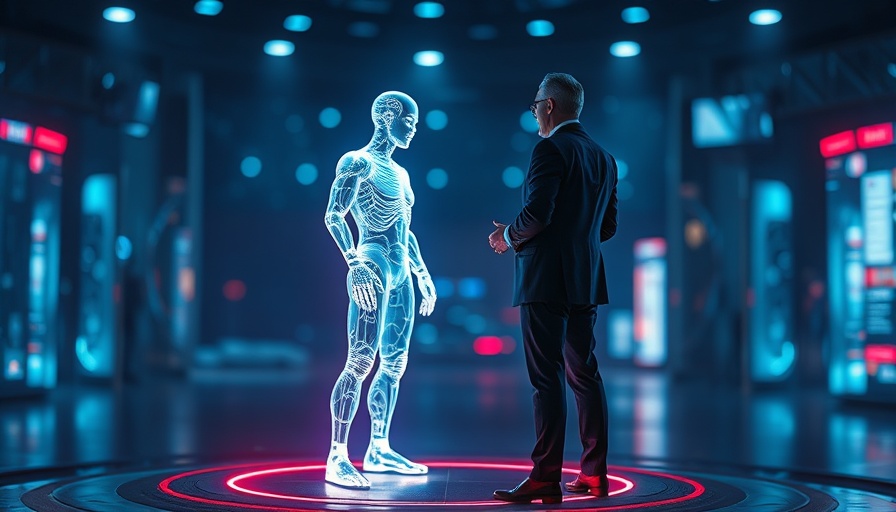
The Rise of AI Agents: A Paradigm Shift in Software Development
In a bold move that could redefine the future of hiring, the AI startup Sensay has announced what it claims to be the world’s first job listing for an autonomous AI agent rather than a human developer. In an industry where software talent is perpetually in demand, Sensay is flipping the script by directly inviting developers to create the software for this AI agent, which will function independently in coding, testing, and fixing software bugs.
Founded on the premise of creating lifelike AI clones capable of performing tasks like attending meetings or managing emails, Sensay aims to merge the capabilities of human-like interaction with machine efficiency. This innovative company states that it manages over half a million interactions daily, underscoring the extensive potential of AI agents in enhancing productivity and operational efficiency across sectors.
Sensay's recent job listing is unique in contrast to traditional roles requiring software engineers or developers. Instead, they're looking to hire a product — the AI agent itself — by asking for fully functional code submissions from human programmers. This approach not only highlights the evolving role of developers but also reflects a shift towards automation in software development that could see AI taking on increasingly complex tasks.
AI Agents: More Than Just Tools
AI agents, as defined by industry experts, are not just advanced pieces of software; they embody a new category of autonomous systems designed to operate independently within specified task parameters. Unlike typical coding tools, they have the capability to learn from previous interactions, adapt to their environments, and innovate solutions in real-time, propelling the software development field forward. Tools like ChatDev and SWE-Agent exemplify this trend, showcasing how AI agents can streamline processes and foster collaboration in creative ways.
However, Sensay does not expect individuals to apply for AI roles directly; instead, they anticipate a wave of submissions from developers eager to showcase their coding acumen by contributing to the design of these intelligent agents. With over 100 applicants already vying for the chance to contribute to such an avant-garde project, it’s clear that interest in AI agents is burgeoning.
Challenging the Workforce Landscape
While the advent of AI agents brings exciting possibilities, it also raises questions about the changing dynamics of the workforce. Developers must now consider not only their competition from other human talents but also from these autonomous AI entities that could perform some coding tasks traditionally held by people. This shift may lead to fears surrounding job security, especially as LinkedIn’s recent survey indicated declining workforce confidence among American workers.
The surge in AI capabilities has galvanized discussions about the evolution of skill sets within tech roles. As organizations like Sensay push the boundaries, developers may increasingly need to transition into overseeing and collaborating with AI agents rather than competing with them.
The Future of AI in Workplaces and Beyond
Sensay represents a broader trend wherein AI is moving beyond being a supportive tool, becoming integral to operations across various sectors including customer service, product development, and more. As AI capabilities grow, they promise to enhance not just efficiency but also creativity among teams, suggesting a future where human-AI collaboration becomes the norm. As founder Dan Thomson stated, bringing an AI employee into the fold represents a monumental stride towards a sophisticated interplay of human and machine.
But integrating AI seamlessly into existing workflows may pose challenges. Organizations must ensure that AI agents align with their operational goals and ethical standards. Examining the examples set by other companies like Deviniti, it's evident that successful AI integration requires a clear understanding of specific business needs, alongside continued monitoring and optimization to maximize the benefits of these advanced systems.
What’s Next for AI Agents?
The path ahead is paved with opportunities and challenges alike. With Sensay’s ambitious initiative igniting a wider conversation, industry watchers will be keen to see how the performance of AI agents measures up to human capabilities. The future may lead to a redefined role for tech professionals as they increasingly become mentors to AI, integrating its strengths while enhancing human creativity.
As interest in AI expands, companies looking to implement such technologies are urged to consider not only the immediate efficiency gains but the long-term implications for workplace culture and the evolving nature of work itself. The time has never been more critical to explore the fascinating and complex world of AI agents and their application across industries.
For those interested in diving deeper into the burgeoning field of AI agent development and integration into software processes, it may be worthwhile to engage with specialists or consult developmental partners like Deviniti, who cater to the poignant needs of AI implementations. Such partnerships can provide valuable insights and mitigate risks associated with venturing into this new territory of artificial intelligence.
 Add Row
Add Row  Add
Add 




 Add Row
Add Row  Add
Add 

Write A Comment